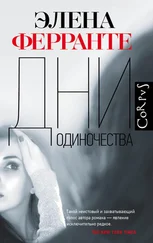10.
What I found out about my father was an unsuspected attachment to money. I caught him several times accusing my mother, in a low but insistent voice, of spending too much and on useless things. Otherwise, his life was the same as ever: school in the morning, study in the afternoon, meetings at night at our house or someone else’s. As for my mother, when it came to money I often heard her reply, also in a low voice: it’s money that I earn, I can spend some of it on myself. But the new fact was that although she had always had a blandly ironic attitude toward my father’s meetings, which, especially to tease Mariano, she called “plots to straighten out the world,” she suddenly began to take part in them, not only when they were held at our house but also, to the explicit annoyance of my father, when they were held at other people’s houses. So I often spent the evenings on the telephone with Angela or Vittoria.
From Angela I learned that Costanza didn’t have the same curiosity as my mother about the meetings, and that even if they were at her house she preferred to go out or watch television or read. I ended up reporting to Vittoria—although with some uncertainty—both those fights about money and my mother’s sudden interest in my father’s evening activities. She unexpectedly praised me:
“You finally realized how attached your father is to money.”
“Yes.”
“It was for money that he ruined my life.”
I didn’t respond, I was just glad I’d finally found some information that satisfied her. She pressed me:
“What does your mother buy?”
“Clothes, underwear. And a lot of lotions.”
“A real bitch,” she exclaimed, pleased.
I understood that Vittoria required events and behaviors of that type, not only to confirm the fact that she was right and my father and mother wrong but also as a sign that I was learning to look beyond appearances, to understand.
That she was pleased by spying of that type basically encouraged me. I didn’t want to stop being their daughter, as she seemed to demand, the bond with my parents was strong and I dismissed the idea that my father’s attention to money or my mother’s small extravagances could make me not love them. The risk was rather that, wanting to gratify Vittoria and solidify the intimacy between us, and having nothing to recount, I would begin almost inadvertently to invent. But, luckily, the lies that came to mind were exaggerated, I attributed crimes so novelistic to my family that I restrained myself, I was afraid that Vittoria would say: you’re a liar. So I ended up looking for small real anomalies and inflating them slightly. But even then I was uneasy. I wasn’t a truly affectionate daughter and I wasn’t a truly loyal spy.
One night we went to dinner at Mariano and Costanza’s house. As we drove down Via Cimarosa a mass of black clouds that extended fringelike fingers struck me as a bad omen. In my friends’ big apartment, I was immediately cold; the radiators weren’t working yet, and I kept on a wool jacket that my mother considered very elegant. Although at our hosts’ house there were always good things to eat—they had a silent maid who cooked very well, I looked at her and thought of Vittoria, who worked in apartments like this—I barely tasted the food because I was worried about getting the jacket dirty: my mother had told me to take it off. Ida, Angela, and I were bored; it took an eternity filled with Mariano’s chatter to get to dessert. Finally, the moment arrived to ask if we could leave the table, and Costanza allowed us to go. We went into the hall and sat on the floor. Ida began throwing a red rubber ball to annoy Angela and me, while Angela was asking me when I would let her meet my aunt. She was especially insistent, and said:
“You want to know something?”
“What?”
“In my opinion your aunt doesn’t exist.”
“Of course she exists.”
“Then if she exists she’s not the way you say. That’s why you won’t let us meet her.”
“She’s even better than what I tell you about her.”
“Then take us to see her,” said Ida, and threw the ball hard at me. To avoid getting hit I flung myself backward on the floor and found myself stretched out between the wall and the open door of the dining room. The table our parents still lingered at was rectangular, set in the middle of the room. From where I was, I saw all four of them in profile. My mother was sitting opposite Mariano, Costanza opposite my father, I don’t know what they were talking about. My father said something, Costanza laughed, Mariano replied. I was lying on the floor and I could see not so much their faces as the outlines of their legs, their feet. Mariano had stretched his under the table, he was talking to my father and at the same time he was squeezing one of my mother’s ankles between his.
I sat up in a hurry with an obscure sense of shame and threw the ball hard at Ida. But I resisted only a few minutes, and lay down on the floor again. Mariano kept his legs stretched out under the table, but now my mother had pulled hers away and turned with her whole body toward my father. She was saying: it’s November but it’s still warm.
What are you doing, Angela asked, and she lay down cautiously, gently, on top of me, saying: until a little while ago we fit perfectly and now, look, you’re longer than me.
11.
For the rest of the evening I never lost sight of my mother and Mariano. She barely took part in the conversation, exchanged not even a glance with him, stared at Costanza or my father, but as if she had urgent thoughts and didn’t see them. Whereas Mariano couldn’t take his eyes off her. He looked at her feet, at a knee, at an ear with a sullen, melancholy gaze that contrasted with the usual tone of his aggressive chatter. The rare times that they exchanged a word, my mother answered in monosyllables, Mariano spoke to her for no reason in a low voice and in a caressing way I had never heard in him. After a while, Angela began to insist that I spend the night with them. She always did that on these occasions, and in general my mother agreed after a few remarks on the bother I might cause, while my father was always implicitly favorable. But this time the request wasn’t immediately agreed to, my mother hesitated. Then Mariano intervened and, after pointing out that the next day was Sunday, and there was no school, assured her that he would bring me himself to San Giacomo dei Capri before lunch. I heard them negotiating pointlessly, it was taken for granted that I would stay, and I suspected that in that exchange—in my mother’s words there was a feeble resistance, in Mariano’s an urgent request—they were saying something else that to them was clear and escaped the rest of us. When my mother agreed that I would sleep with Angela, Mariano had a serious, almost emotional expression, as if on my staying overnight depended, I don’t know, his university career or the solution of the serious problems that he and my father had been engaged with for decades.
Shortly before eleven, after much hesitation, my parents decided to go.
“You don’t have any pajamas,” my mother said.
“She can wear a pair of mine,” said Angela.
“And a toothbrush?”
“She has hers, she left it the last time and I put it away.”
Costanza intervened with a hint of sarcasm at that anomalous resistance in the face of something completely normal. When Angela stays at your house, she said, doesn’t she wear a pair of Giovanna’s pajamas, doesn’t she have her toothbrush? Yes, of course, my mother gave in uneasily and said: Andrea, let’s go, it’s late. My father got up from the couch with a slightly annoyed expression, he wanted a good-night kiss from me. My mother was distracted and didn’t ask me, she kissed Costanza, instead, on both cheeks, with smacks that she never made and that seemed to me dictated by the need to underline their old pact of friendship. Her eyes were agitated, I thought: what’s wrong, she doesn’t feel well. She was about to head toward the door but, as if she suddenly remembered that she had Mariano right behind her and hadn’t said goodbye, she almost fell back against his chest as if she were fainting, and in that position—while my father was saying goodbye to Costanza, praising the dinner yet again—she turned her head and offered him her mouth. It was an instant, with my heart in my throat I thought they would kiss as in the movies. But he touched her cheek with his lips and she did the same.
Читать дальше
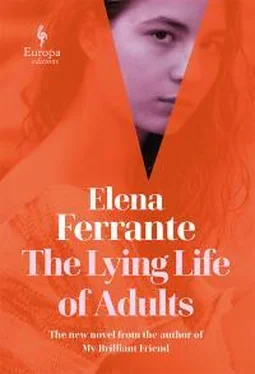
![Элена Ферранте - История о пропавшем ребенке [litres]](/books/32091/elena-ferrante-istoriya-o-propavshem-rebenke-litres-thumb.webp)
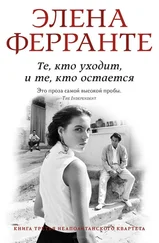
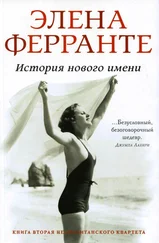
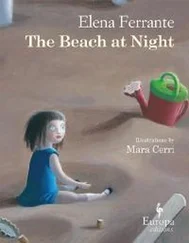
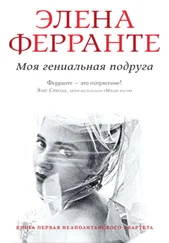
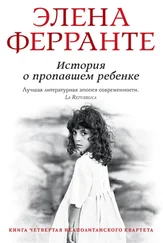
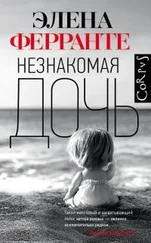
![Элена Ферранте - Дни одиночества [litres]](/books/404671/elena-ferrante-dni-odinochestva-litres-thumb.webp)


